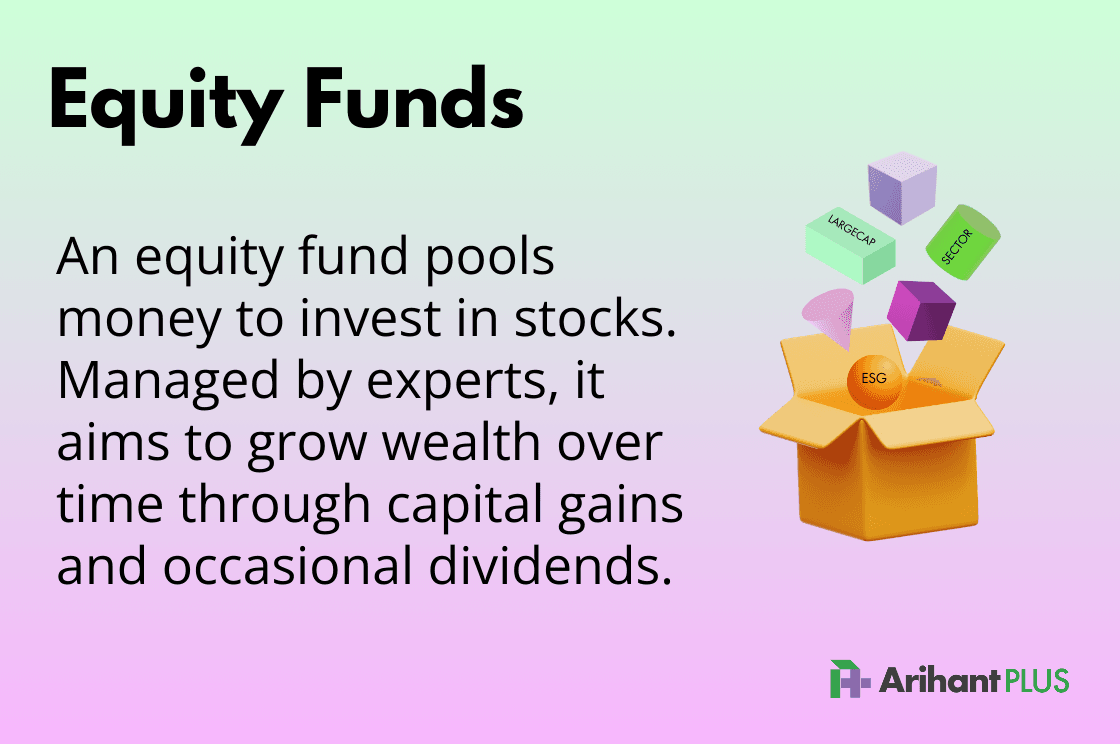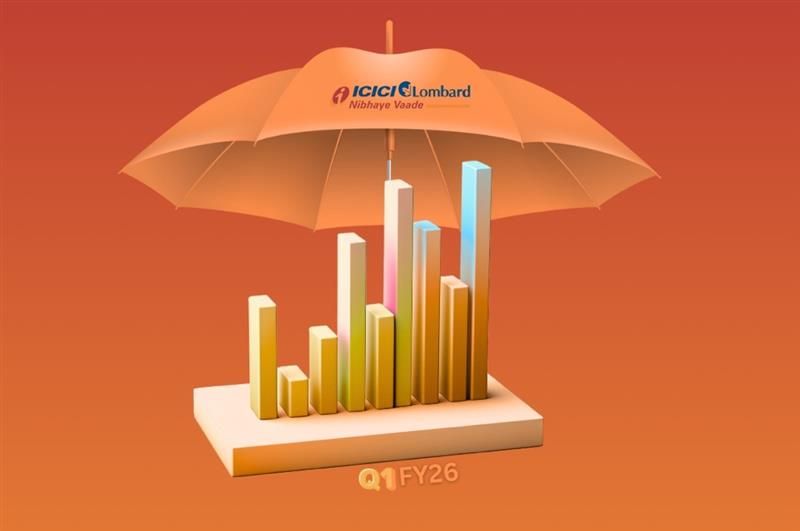
What Is an Equity Fund? Types, Benefits & How to Invest in Equity Funds
By
Arihant Team
Equity funds help build long-term wealth for investors willing to take risk. With various types available - from active and passive to sectoral and diversified, they cater to different risk profiles, investment horizons, and budgets.
In This Article
- Understanding the Basics of Equity Funds
- Types of Equity Funds by Market Capitalization: Which Cap Size Suits You?
- Sectoral and Geographic Equity Funds
- Types of Equity Funds by Investment Strategy: Active vs Passive
- Top Benefits of Equity Funds
- How to pick the right equity fund for investment
- Equity Fund vs Mutual Fund
- Final Thoughts: Align, Invest, Review
Understanding the Basics of Equity Funds
Imagine walking into a bustling market not to shop for fruits or clothes, but to invest in a piece of some of the most promising businesses out there. That’s exactly what an equity fund does in the world of investing.
As the name suggests, an equity fund primarily invests in publicly traded companies (stocks) of various market capitalisations and sectors. It basically pools your money with other investors to buy a basket of stocks, all handpicked and managed by experts. These funds can be structured as mutual funds or exchange-traded funds (ETFs). The aim is to generate returns through capital appreciation, dividends, or both for a small fee.
Whether you're a first-time investor trying to grow your wealth or someone looking to beat inflation over the long run, equity funds offer a smart and accessible way to participate in the stock markets, without needing to be a stock market wizard yourself.

Types of Equity Funds by Market Capitalization: Which Cap Size Suits You?
Equity funds can be categorized based on the size of the companies they invest in measured by market capitalization. Each category comes with a distinct risk-return profile, helping you choose funds that align with your financial goals and risk appetite.
- Large Cap Equity Fund: These funds invest in stocks of top 100 companies by market cap, which are generally industry leaders. Think of Infosys, Reliance, HDFC, and Mahindra. These funds offer steady returns with relatively lower volatility and are ideal for conservative or first-time investors.
- Mid Cap Equity Fund: These funds focus on high growth companies, ranked 101–250 in terms of market cap. These funds offer a balance between growth potential and stability higher returns than large caps, but with moderate risk.
- Small Cap Equity Fund: These funds focus on companies beyond the top 250 by market cap. More than 95% of companies listed on the Indian stock exchange fall into this category. Small cap funds have high growth potential but are also more volatile and sensitive to market fluctuations. Best suited for aggressive, long-term investors.
- Multi-Cap Funds: As the name suggests, a multi-cap fund invests in companies across different market cap. Unlike large, mid or small cap funds it follows a flexible investment approach and creates a portfolio of stocks irrespective of their size.
Sectoral and Geographic Equity Funds
These funds invest in specific sectors or regions, offering targeted exposure for investors with high conviction in a theme or geography. While they can deliver higher returns, they also come with concentrated risk and are better suited for experienced investors or those with a diversified portfolio.
By Sector or Theme
These equity funds narrow their investments to specific sectors (industries) or investment themes. They offer high growth opportunities but inherently carry very high risk. This concentrated exposure means that if your chosen sector or theme underperforms, you have a greater susceptibility to losses compared to a more diversified fund.
- Sectoral Funds: Invest in a single sector like banking, IT, pharma, or infrastructure. Returns are closely tied to the performance of that sector. High risk, high reward.
- Thematic Funds: Broader than sectoral funds may include multiple sectors tied to a theme (e.g., consumption, innovation, or rural development).
By Geography
These funds invest in companies outside India, offering global diversification. They help reduce country-specific risk but are affected by currency and geopolitical factors.
- International or Global Equity Funds: Invest in companies outside India, either partially or fully. Great for diversification and exposure to global leaders like Apple, Amazon, or Tesla.
- Region-Specific Funds: Focus on a particular region like the US, Japan, Europe, or emerging markets. Subject to currency and geopolitical risks, but valuable for hedging against domestic downturns.
Specialty Equity Funds
These funds cater to investors who want their portfolios to reflect their values or beliefs ethical, environmental, or religious. While niche, they’re gaining popularity as conscious investing grows globally.
- ESG Funds: These funds prioritise environmental, social, and governance (ESG) factors in their investment decisions with the aim of generating financial returns. These invest in companies that care for the planet, treat people fairly, and follow ethical practices avoiding industries like fossil fuels, fast fashion, or poorly managed businesses.
- Shariah-Compliant Equity Funds: These funds are designed for investors who wish to invest in accordance with Islamic principles. They avoid interest-based companies, highly leveraged firms, and sectors like alcohol, gambling, and pork-related products.
- Vegan or Cruelty-Free Funds: Vegan funds invest in companies that are aligned with vegan principles. They exclude companies involved in animal testing, animal agriculture, or the use of animal-derived products like leather, meat, dairy, etc. They aim to support businesses that promote animal welfare, and often environmental protection. Currently, there are no vegan mutual fund schemes in India, but there are globally like the US Global Climate Fund.
By Investment Style
These equity funds follow different investing philosophies to match various risk profiles and return expectations.
- Growth Funds – These funds invest in companies expected to grow at an above-average rate and deliver high returns over time.
- Value Funds – These funds focus on investing in undervalued companies with strong fundamentals, that are expected to substantially grow in the future. Hence aiming for long-term gains.
- Dividend Yield Funds – These funds focus on generating consistent income for investors by primarily investing in companies that regularly pay out a portion of their earnings as dividends.
By Theme or Strategy
These funds apply unique strategies or focus areas to optimize returns or meet specific goals.
- Sectoral Funds – Sectoral funds invest in companies related to a specific sector like technology or healthcare.
- Thematic Funds – thematic funds invest in companies related to a specific long-term “theme" across various sectors, such as artificial intelligence, renewable energy, or aging populations.
- ELSS Tax Saving Equity Funds – ELSS or Equity Linked Saving Scheme is a diversified equity fund that comes with an added benefit of offering tax deductions under Section 80C.They come with a mandatory 3-year lock-in period and qualifies for tax deductions under Section 80C of the Income Tax Act. You can invest up to ₹1.5 lakh per financial year in ELSS and claim that amount as a deduction from your taxable income. These funds are also commonly known as tax-saving mutual funds, offering the dual benefit of potential long-term wealth creation and tax savings.
Types of Equity Funds by Investment Strategy: Active vs Passive
When investing in equity mutual funds, your approach can be either active or passive each comes with its own pros and cons:
Actively Managed Equity Funds
These funds are managed by professional fund managers who try to outperform the market by picking winning stocks and timing investments.
- Benefits: Potential to beat index returns (generate “alpha”) if the manager makes good calls.
- Drawbacks: Higher expense ratios, and performance depends heavily on manager skill.
- Returns: They aim at outperforming the markets.
- Best for: Investors with a high risk tolerance who are seeking higher returns.
Passively Managed Equity Funds
These funds aim to replicate a specific stock market index (like Nifty 50 or Sensex) rather than beat it. Unlike an active fund, they don’t rely on fund managers to pick winning stocks but simply track the performance of the index. Index funds and ETFs fall under this category.
- Benefits: Low cost (low expense ratio), transparent, and ideal for long-term, low-maintenance investing.
- Drawbacks: They will never beat the market returns - they are designed to match it.
- Returns: They offer market returns.
- Best for: Beginners or cost-conscious investors or those with moderate risk tolerance who want market returns and prioritise simplicity.
Top Benefits of Equity Funds
Equity funds offer a powerful way to participate in the growth of the stock market without needing to pick individual stocks. They combine diversification, professional management, and ease of access making them a preferred choice for all kinds of investors. Here are some of their key advantages:
- Spread risk across sectors, companies, and market caps.
- Fund managers actively track market trends and adjust portfolios.
- Easy to buy/sell. SIPs make it affordable.
- Potential to beat inflation and create wealth.
- Can offer tax benefits
How to pick the right equity fund for investment
Investing in equity funds is simple but doing it right requires clarity, planning, and the right platform. Whether you're a beginner or a seasoned investor, following a structured process can help you make better choices and stay aligned with your financial goals. Here's a step-by-step guide to get started:
1. Define Your Financial Goals
Are you saving for retirement, a house, or your child’s education? Your goals determine the investment horizon. Equity funds suit long-term goals due to their growth potential but may not be ideal for short-term needs.
2. Assess Your Risk Tolerance
If you're comfortable with market ups and downs, you may consider mid- or small-cap funds. For lower risk, large-cap or index funds are better. Matching the fund with your risk profile helps you stay invested longer.
3. Choose the Right Type of Equity Fund
There are different kinds of equity funds:
- Large-cap funds (stable, lower risk)
- Mid- and small-cap funds (higher growth potential, higher risk)
- ELSS (Equity Linked Saving Schemes offer tax benefits under Section 80C)
- Sectoral or thematic funds (concentrated bets, high risk)
Select based on your investment horizon, tax planning needs, and risk appetite.
4. Compare Fund Metrics
Before investing, compare key fund parameters:
- Expense Ratio: Lower is better; it directly affects your returns.
- Past Performance: While not a future guarantee, it offers insights into how consistently the fund has performed across different market cycles.
- Fund Manager’s Track Record: A strong, experienced fund manager often makes a real difference.
5. Complete KYC (Know Your Customer) Process
KYC is mandatory for mutual fund investments in India. You’ll need a PAN card, Aadhaar, and basic personal details. You can sign-up on ArihantPlus online using only your Pan card or Aadhar and invest in mutual funds in a few minutes. Quick, easy and completely paperless.
6. Choose Your Investment Mode: SIP or Lump Sum
- SIP (Systematic Investment Plan): It allows you to invest small, fixed amounts regularly reducing risk through rupee-cost averaging. You can invest as low as Rs 100 per month through SIP.
- Lump Sum: Suitable when you have a larger amount ready and want to invest based on market outlook or a specific opportunity.
7. Use a Trusted Platform Like ArihantPlus
If you have an account with ArihantPlus, you can invest directly through the mobile app or web platform. It offers a seamless interface, expert-curated fund lists, and easy tracking making the entire investing experience smooth and accessible.
Other Risk Factors to Note:
- Market Risk: Equity prices fluctuate based on market sentiment, news, and economic factors.
- Expense Ratio: This is the annual fee charged by the fund house. Lower ratios improve your effective returns.
- Lock-In Periods: Only ELSS (Equity Linked Saving Schemes) have a 3-year lock-in, others are generally open-ended.
- Exit Loads: Some funds may charge a fee if you redeem within a short time (typically under 12 months).
- Risk Profile Alignment: Always choose funds that suit your financial goals and risk appetite aggressive investors can opt for small-cap funds, while conservative ones may prefer large-cap or balanced funds.
Equity Fund vs Mutual Fund
Equity funds are a type of mutual fund that primarily invest in stocks to generate long-term capital growth. Mutual funds can be of many types equity, debt, hybrid, or even sector-specific each with different risk-return profiles.
Final Thoughts: Align, Invest, Review
Equity funds offer a wide range of investment opportunities for every type of investor. Whether you’re seeking long term wealth creation for your long term goals like retirement, want growth coupled with tax-saving options like ELSS, prefer stability with large-cap equity funds, or want high-growth with small-cap strategies, there’s an equity fund for you.
Seasoned investors often diversify their investment to reduce risk and improve long-term returns. Of course, every investment carries some level of risk, so the best approach depends on your personal finances and how much risk you're comfortable taking.
Tags
Equity Funds | Benefits of Equity Funds | How to Invest in Equity Funds | Mutual Fund Investment | Types of Equity Funds
Related Topics










